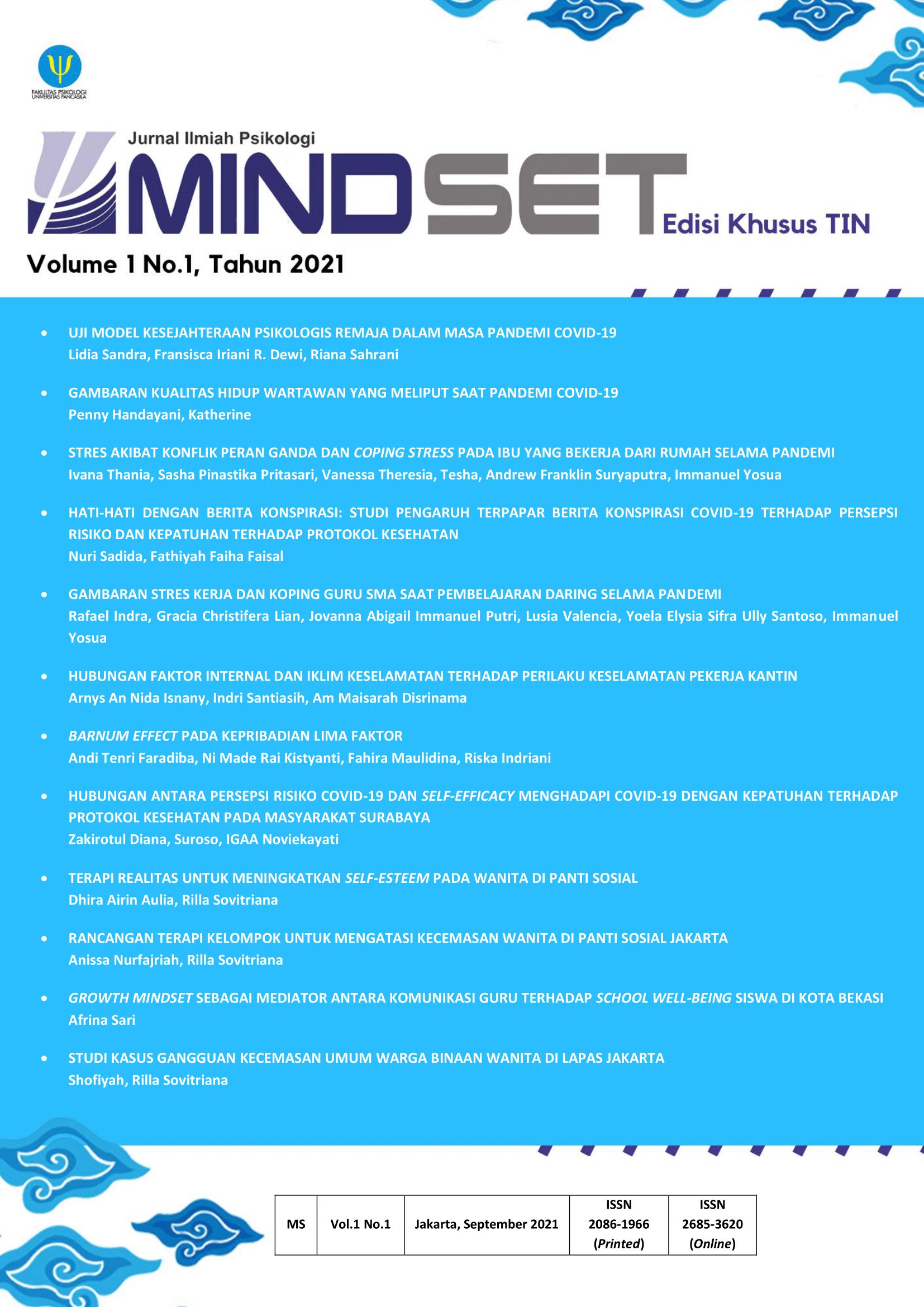Terapi Realitas untuk Meningkatkan Self Esteem pada Wanita di Panti Sosial
DOI:
https://doi.org/10.35814/mindset.v1i01.2613Keywords:
self esteem, rosenberg self esteem scale, reality therapyAbstract
Panti Sosial Wanita is one of the implementing units (UPT) within the Ministry of Social Affairs of the Republic of Indonesia which is given the task to provide services and rehabilitation for beneficiaries. Based on the results of field observations and interviews with beneficiaries at the Social Home for Women in Jakarta, it is known that many beneficiaries who have difficulty in following coaching programs such as decreased self esteem are marked by solitary behavior, shyness, easy to give up, pessimistic, passive and unstable emotions. The subjects of this study were beneficiaries in women's social homes as many as 5 people. The purpose of this study is to find out the picture of self esteem in Beneficiaries in Women's Social Homes and get the results of the application of Reality therapy with WDEP techniques to increase self esteem in Beneficiaries in Women's Social Homes Jakarta, this form of therapy is carried out systematically for 10 sessions. This study uses quasi-experimental data analysis techniques using pattern matching and analysis of developmental results. Self esteem measurement results using Rosenberg Self Esteem Scale (RSES) in the form of pre-test and post-test. Pre-test results showed an average score of 14 groups with low self esteem categories. Based on the results of the application of reality therapy with WDEP techniques the subjects showed behavior willing to socialize, not shy, unyielding, optimistic, active and stable emotions. These results are supported by post-test results using the RSES scale with an average score of 29 groups in the moderate self esteem category.
References
Adi, Isbandi Rukminto. (2005). Ilmu Kesejahteraan Sosial dan Pekerjaan Sosial. FISIP UI PRESS.
American Psychiatric Assosiation. (2000). Diagnostic and Statistical Manual of Mental Disorder (4th ed.). Washington DC: American Psychiatric Assosiation Press.
Azwar, Saifuddin. (2012). Metode penelitian. Yogyakarta: Pustaka Pelajar.
Baumeister, R. F., Campbell, J. D., Krueger, J. I., & Vohs, K. D. (2003). Does high self-esteem cause better performance, interpersonal success, happiness, or healthier lifestyles. Psychological Science in the Public Interest, 4, 1–44.
Bos, AER, Muris, P., Mulkens, S., & Schaalma, HP. (2006). Changing self-esteem in Children and adolescents: A Roadmap for future Interventuons. Netherlands Journal of Psychology, 62, 26-33.
Brown, J.D. (1998). The Self. Boston: Mc Graw-Hill.
Brown, N. (2008). Predicting College Adjustment: The Contribution of Generation Status and Parental Attachment. Albany State University of New York.
Corey, G. (2013). Teori dan Praktek Konseling dan Psikoterapi. Bandung: Refika Aditama.
Feist, J, & Gregory, J. Feist. (2010). Teori Kepribadian. Jakarta: Salemba Humanika.
Guindon, M.H. (2010). Self Esteem Across The Lifespan. New York: Routledge Taylor & Prancis Group.
Habibullah, Naderi, et.al. (2009). Self Esteem, Gender and Academic Achievement of Undergraduate Students. American Journal of Scientific Research, Iss 1450-223X issue 3, 26-37.
Lynne Simpson-Scott, B.A., M.S.L.S. (2009). Self-perceived Information Seeking Skills and Self-esteem in Adolescents by Race and Gender. University of North Texas.
Neff, K. & Vonk, R. (2009). Self-compassion and global self-esteem: Two different ways of relating to oneself. Journal of personality, 77(1), 23-50.
Sulityowati, Wida. & Warsito, Hadi. (2010). Penerapan Konseling Realita Untuk Meningkatkan Harga Diri Siswa. E-Journal of Education Psychology, 57, 13. Retrieved from http://ejournal.unesa.ac.id/index.php/jurnal_ppb/article/view/5407
Sunawan & Xiong, Junmei. (2016). An Application Model of Reality Therapy to Develop Effective Achievement Goals in Tier Three Intervention. International Education Studies; Vol. 9, No. 10; 2016 ISSN 1913-9020 E-ISSN 1913-9039. Published by Canadian Center of Science and Education.












